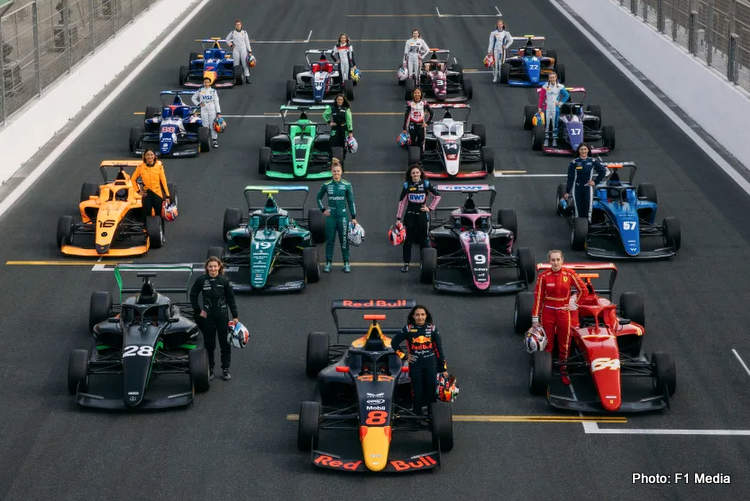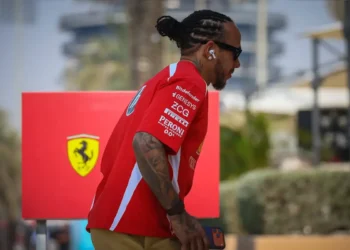As the powers that be try to promote the women-only championship to fans, exaggerating the series beyond its deserving status, the goal of having a female driver enter and win races in F1, which is the fundamental goal for all drivers, is being overshadowed.
The quest to have a female driver in F1 has taken a peculiar turn with the introduction of an F1 Academy exclusively for women by the powers that be in the FOM. However, the skill level of these drivers typically falls below those at the back of the grid in regular Formula 4 events. Most female drivers are there mainly for their marketability, and with the exception of one or possibly two, they are not particularly talented.
F1 is engaging in marketing efforts to appear politically correct and promote equality. They are elevating a series known as ‘Formula Suzi’ in certain circles to unwanted heights, as ‘Mrs Toto Wolff’ essentially runs what used to be the W-Series under a new brand.
F1, of course, is presenting this project as the next big thing. However, the dream of a woman reaching F1 through the Academy is doomed to fail. The opening weekend in Jeddah clearly demonstrated that these young women have much to learn and are far from the level of a Max Verstappen or even a Logan Sargeant.
None of them will ever win Grand Prix races. Watching them in action would be comical if it weren’t so disheartening when compared to the achievements of real drivers on the genuine path to F1.
The excessive promotion of this series by FOM across its various platforms is overwhelming. They are dedicating much more attention to it than to Formula 2 and Formula 1. Essentially, they are elevating this lower rung of the motorsport ladder, the F1 Academy, to a level above the exposure given to the true feeder racing series for F1, the FIA F2 and FIA F3, where the real future talent resides, including drivers like Ollie Bearman.
To make matters worse, overly enthusiastic commentators are daring to compare the races of this series to F1, which only serves to devalue and diminish the sport in order to justify the substandard races they have to commentate on to promote this agenda.
Furthermore, it must be acknowledged that there are many more women who deserve a place on the F1 Academy grid based on their merit and results in non-sexist racing series against men, much more than the 16 drivers they have chosen to showcase this season.
Fortunately, there are respectable analysts who are not hindered by contracts or confidentiality agreements and are able to provide honest assessments of the situation. Needell is one of those commentators who shared his unfiltered thoughts in the latest episode of the Fuelling Around podcast. As a respected former F1 driver and authority in the world of motorsport, he offers valuable insights.
When discussing how drivers, including women, can enter the world of Formula 1, Tiff Needell gets straight to the point. He believes that nowadays, it simply takes having a significant amount of money. Needell is frustrated by the fact that motorsport is often accused of being sexist and not giving women a fair chance.
He vehemently disagrees with these accusations and mentions his own experience competing against Desire Wilson in the British Formula 1. Although neither of them managed to become Ferrari drivers at the time, Needell recognizes Wilson as a talented and impressive driver.
Desire Wilson has the distinction of being the only woman to win an official F1 race, specifically the Brands Hatch stage of the 1980 F1 Aurora Championship. She competed for teams like Williams and March in previous seasons and then moved to the USA, where she excelled in Group C races, including driving the powerful Porsche 935. Wilson is widely considered not only the best female driver of her generation, but also earned the respect of her male rivals based solely on her skill.
According to Needell, women have always been involved in motorsport, and he believes they have always been encouraged. Although there may be some competitive tension between male and female drivers, he dismisses the notion that Formula 1 is inherently biased against women. Needell argues that the presence of young boys in the sport is mainly due to the financial resources of their parents, whether they are wealthy or have commercial connections.
Needell further emphasizes the challenges of bringing a girl or woman into Formula 1, as there are many other people competing for the opportunity. He points out that there is a long line of people waiting to enter the sport, making it even more competitive.
At 72 years old, Needell reflects on his own racing career in motorsport, which began in Formula Ford. He won the FF16000 championship in 1975 and finished second in the FF2000 series the following year. Although his dreams of competing in Formula 1 were initially thwarted in 1979 when he was denied a superlicense to drive for Ensign, he finally got his chance in 1980.
Throughout his career, Needell expanded his racing repertoire to include Japanese Formula 2, touring cars, the Procar series, and sports car races. He remained active in these disciplines during the 1980s and 1990s, especially with the Lister Storm.
However, it is Needell’s successful career as a journalist and presenter that has brought him the most recognition and fame.
© 2024
Formula 1 driver Lewis Hamilton continues to dominate headlines with his incredible performances and his fight for racial equality. The seven-time world champion has been an active advocate for diversity and inclusion in the sport, using his platform to promote significant changes.
Hamilton recently set a new record in Formula 1, achieving his 100th victory at the Russian Grand Prix. His unparalleled determination and skill have made him one of the greatest drivers of all time. With each win, he continues to write his name in the history books of the sport.
In addition to his achievements on the track, Hamilton has also been a powerful voice in the fight against racism. He has used his influence to draw attention to issues of social justice and to promote equal opportunities. His foundation, the Hamilton Commission, is working to increase diversity in motorsport and other industries.
Hamilton has also been an advocate for the environment, promoting sustainability and raising awareness about climate change. He is one of the most engaged drivers in ecological initiatives, encouraging Formula 1 to adopt more sustainable practices.
With his talent on the tracks and his activism off them, Lewis Hamilton has become an iconic figure in the world of sports. His dedication to achieving equality and his passion for important causes make him an inspiring example for athletes and fans around the world.










